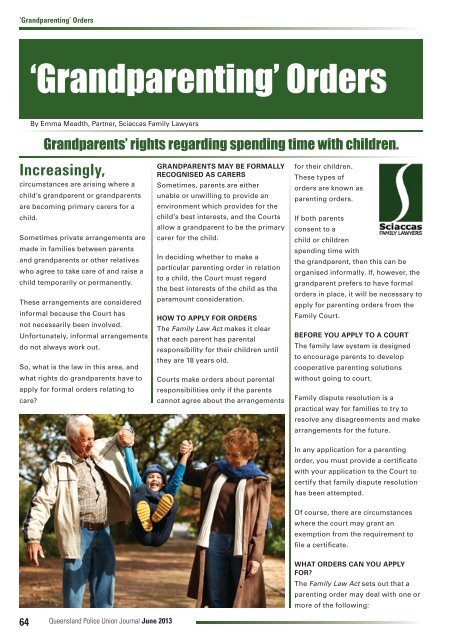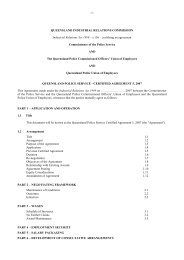Queensland Police Union Journal
Queensland Police Union Journal
Queensland Police Union Journal
Create successful ePaper yourself
Turn your PDF publications into a flip-book with our unique Google optimized e-Paper software.
‘Grandparenting’ Orders<br />
‘Grandparenting’ Orders<br />
By Emma Meadth, Partner, Sciaccas Family Lawyers<br />
Grandparents’ rights regarding spending time with children.<br />
Increasingly,<br />
circumstances are arising where a<br />
child’s grandparent or grandparents<br />
are becoming primary carers for a<br />
child.<br />
Sometimes private arrangements are<br />
made in families between parents<br />
and grandparents or other relatives<br />
who agree to take care of and raise a<br />
child temporarily or permanently.<br />
These arrangements are considered<br />
informal because the Court has<br />
not necessarily been involved.<br />
Unfortunately, informal arrangements<br />
do not always work out.<br />
So, what is the law in this area, and<br />
what rights do grandparents have to<br />
apply for formal orders relating to<br />
care?<br />
GRANDPARENTS MAY BE FORMALLY<br />
RECOGNISED AS CARERS<br />
Sometimes, parents are either<br />
unable or unwilling to provide an<br />
environment which provides for the<br />
child’s best interests, and the Courts<br />
allow a grandparent to be the primary<br />
carer for the child.<br />
In deciding whether to make a<br />
particular parenting order in relation<br />
to a child, the Court must regard<br />
the best interests of the child as the<br />
paramount consideration.<br />
HOW TO APPLY FOR ORDERS<br />
The Family Law Act makes it clear<br />
that each parent has parental<br />
responsibility for their children until<br />
they are 18 years old.<br />
Courts make orders about parental<br />
responsibilities only if the parents<br />
cannot agree about the arrangements<br />
for their children.<br />
These types of<br />
orders are known as<br />
parenting orders.<br />
If both parents<br />
consent to a<br />
child or children<br />
spending time with<br />
the grandparent, then this can be<br />
organised informally. If, however, the<br />
grandparent prefers to have formal<br />
orders in place, it will be necessary to<br />
apply for parenting orders from the<br />
Family Court.<br />
BEFORE YOU APPLY TO A COURT<br />
The family law system is designed<br />
to encourage parents to develop<br />
cooperative parenting solutions<br />
without going to court.<br />
Family dispute resolution is a<br />
practical way for families to try to<br />
resolve any disagreements and make<br />
arrangements for the future.<br />
In any application for a parenting<br />
order, you must provide a certificate<br />
with your application to the Court to<br />
certify that family dispute resolution<br />
has been attempted.<br />
Of course, there are circumstances<br />
where the court may grant an<br />
exemption from the requirement to<br />
file a certificate.<br />
WHAT ORDERS CAN YOU APPLY<br />
FOR?<br />
The Family Law Act sets out that a<br />
parenting order may deal with one or<br />
more of the following:<br />
64 <strong>Queensland</strong> <strong>Police</strong> <strong>Union</strong> <strong>Journal</strong> June 2013
















